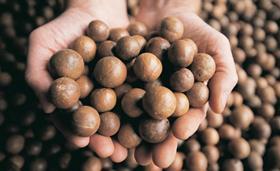
South African macadamia production is increasing rapidly and the country is now the leading world exporter.
This has led to the establishment of a producer organisation as a separate independent entity outside Subtrop, the producer group that deals with the affairs of subtropical fruits industry in the country.
Subtrop handled the industry affairs of the industry for more than a decade.
With rapid growth in the blueberry business, the growth in macadamia nuts signals significant changes in the country’s total fresh produce export basket.
South Africa has moved fairly swiftly to become one of the world's leading producers of the nut. Production rose from 3,000 tonnes in 1996 to over 40,000 tonnes in 2015, and, according to the industry, almost 4,000 hectares of new trees are added each year.
According to the latest tree sales data received from nurseries for 2017, the macadamia industry is still growing rapidly. It is reported that in 2017 alone the Southern African macadamia industry planted 5,000 new hectares.
Mpumalanga remains the major production region in South Africa, and has the highest growth rate. The North Coast of KwaZulu-Natal has responded to its appetite for macadamias and new plantings in this province are increasing substantially. In terms of established hectares, KwaZulu-Natal is now the second largest production region.
“When the growth by the number of trees sold is taken into consideration, there is already approximately 32,500ha established in South Africa,” said Lizel Pretorius, CEO of The Southern African Macadamia Growers’ Association (SAMAC).
Production in South Africa has increased exponentially and the rate of production is expected to increase even more in the near future due to an exponential increase in new plantings annually.
As is the case with a number of food products, it seems demand in China is leading the way. The vast majority of South African macadamia nuts are exported, either in the shell or as kernals.
The growth in macadamia kernal exports is fairly rapid and is becoming a feature of the industry.
A further benefit for the export industry in 2017 was China’s decision to reduce tariffs on some imported consumer goods. A total of ten nuts and dried fruit were among those affected.
Import tariffs on the Brazil nut, cashew, and pecan fell to 7 per cent — which included dried, fresh, in-shell and no-shell goods. As for the macadamia nut, the tariff rate dropped from 19 per cent to 12 per cent.



